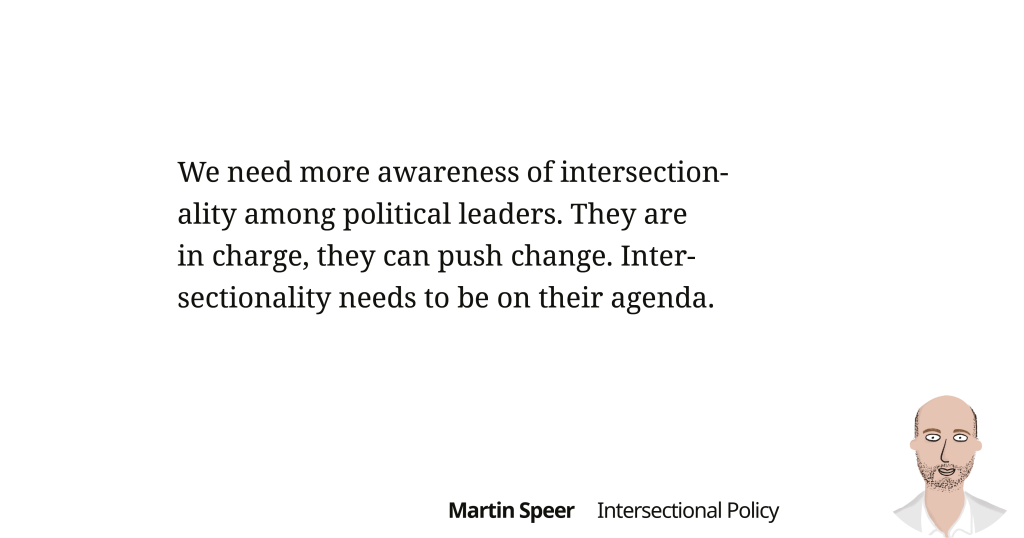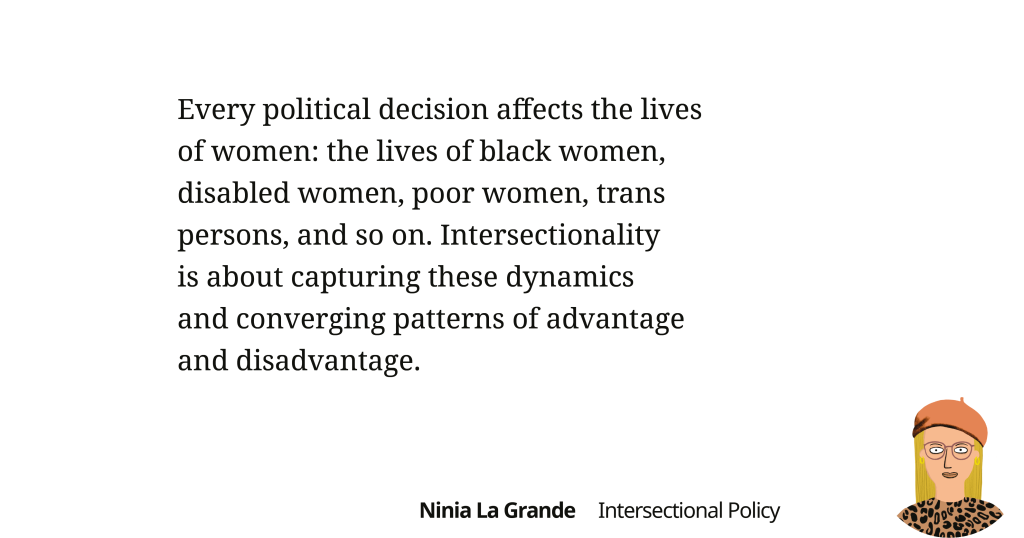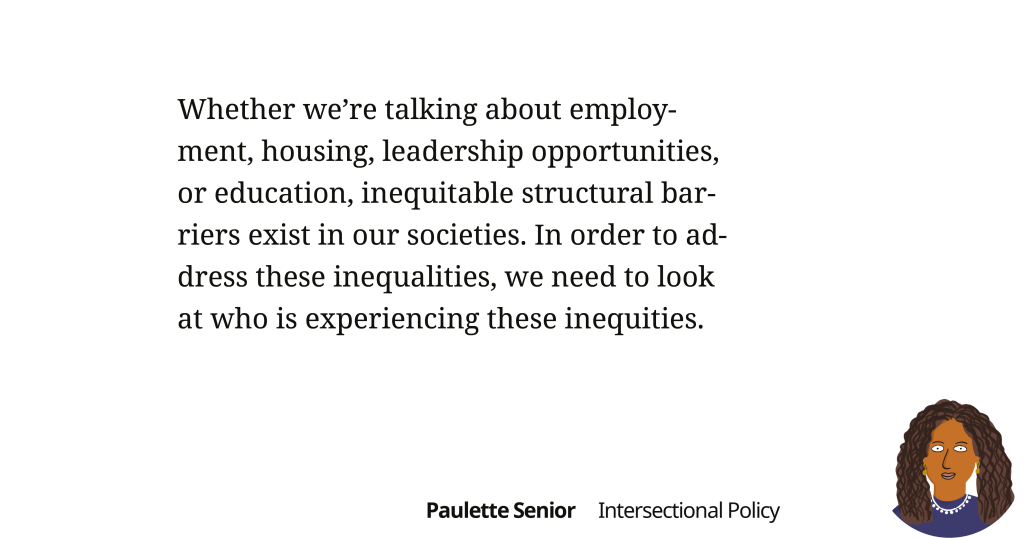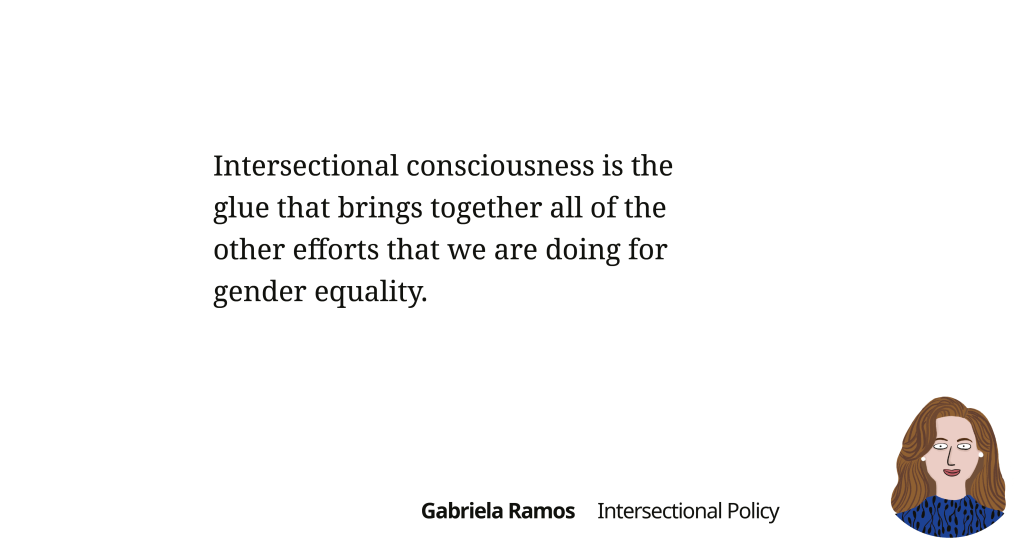Intersectional Policy

In politics and society at large, questions around gender equality and policy are typically viewed, evaluated, and communicated from a perspective that begins with a basic comparison of men and women—for example, whether a particular initiative can benefit women, or in which areas women are disadvantaged. Consequently, the power dynamics of categories such as race, class, sexual orientation, or ability are overlooked, downplayed, and too rarely included in political decision-making.
For example, legal requirements for the advancement of women, such as quota regulations for executive positions passed by the German parliament in January 2021, do not impose any further requirements or accompanying proposals to consider factors such as race, ability, age, or class. Efforts to increase the proportion of women in STEM rarely promote marginalized women—in part because existing data sets on the gender gap are incomplete and do not do justice to the complexity of gender inequality.[1] Access to paid parental leave, already limited in the United States, often excludes LGBTQ+ parents and further disadvantages those who are already at higher risk of poverty or discrimination.[2]
Feminist politics that primarily align with the standard of white, heterosexual, abled, middle-class women will thus fail to represent the breadth of women’s experience and generally of society as a whole. At the same time, they cannot adequately capture the reality of those at the bottom of the income distribution. By ignoring the different dimensions that may cause an accumulation of disadvantages for certain groups, we risk delivering ineffective policy decisions. As a result, existing injustices and social grievances are perpetuated rather than reduced.
As writer Zoe Samudzi highlights, “woman is not a catchall category that alone defines all our relationships to power.” Similarly, legal scholar Kimberlé Crenshaw observed that an intersectional approach can help develop better, more inclusive, and effective solutions to society’s greatest challenges by “capturing dynamics and converging patterns of advantage and disadvantage.”[3] Rather than confronting different forms of discrimination independently, intersectional policies anticipate and address structural inequalities that arise in their overlap. To do so, they start at the institutional level and attempt to influence the allocation of resources and opportunities.
[1] Genoneva Vargas-Solar, “Intersectional Study of the Gender Gap in STEM through the Identification of Missing Datasets about Women: A Multisided Problem,” Applied Sciences 2022, 12 (5813).
[2] Mary Beth Maxwell, Ashland Johnson, Mark Lee, and Liam Miranda, “U.S. LGBTQ Paid Leave Survey,” (Human Rights Campaign Foundation Public Education & Research, 2018).
[3] “What Does Intersectionality Mean in 2021? Kimberlé Crenshaw’s Podcast is a Must-Listen Way to Learn,” Interview by Kelly Moffitt, Columbia News (22 Feb 2021).
Our Experts

Ninia “La Grande” Binias (Germany) is a writer, host, and actress from Hanover, Germany. Her main fields of interest are politics and pop culture, with a focus on ableism and feminism. In 2020 Ninia received the Stadtkulturpreis, the Hanover city Cultural Prize, for her activism and artistic achievements.

Gabriela Ramos (Mexico) is the Assistant Director-General for the Social and Human Sciences of UNESCO, where she oversees the institution’s contributions to building inclusive societies. She previously worked as Cabinet Director and Sherpa for G20, G7 and the Asia-Pacific Economic Cooperation (APEC) at the OECD.

Paulette Senior (Canada) has devoted her life and career to breaking down systemic barriers and building up diverse women and girls. Her personal experience immigrating to Canada from Jamaica as a young girl ignited her interest in social justice, and she is a sought-after thought leader on issues of gender equity and gender-based violence; women’s poverty and the wage gap; girls’ empowerment; and leadership. Since 2016, Ms. Senior has served as the President and CEO of the Canadian Women’s Foundation.

Martin Speer (Germany) is a HeForShe catalyst for UN Women Germany and partner at Herr & Speer, a political consulting firm focused on gender equality and European integration. He is a believer in institutional responsibility for equality and has advised political and societal stakeholders on this topic.
Statements from our members
Features
-
 Videos
VideosMartin Speer on Intersectional Policy
 More
More
-
 Videos
VideosGabriela Ramos on Intersectional Policy
 More
More
-
 Videos
VideosNinia LaGrande on Intersectional Policy
 More
More
-
 Videos
VideosPaulette Senior on Intersectional Policy
 More
More
-
 Videos
VideosA message from Mustapha Mourahib (Clifford Chance)
 More
More
Show all RELATED Features





